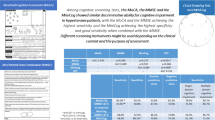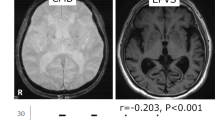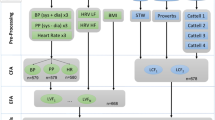Abstract
Hypertension causes cognitive impairment, involving mainly executive functions, but the effect of blood pressure (BP) control on the different cognitive domains is still debated. We correlated executive function, attention and memory with BP control and cerebrovascular damage in 60 undemented middle-aged hypertensives at baseline and after 6-year follow-up. At first evaluation, the patients with poor BP control had higher score of white matter lesions, reduced cerebrovascular reserve capacity and greater carotid intima-media thickness (IMT) than those with good BP control. Performance on executive tests correlated with IMT and with performance on attention tests, which was impaired by low diastolic BP. At long-term follow-up, performance in attention and executive tests improved in spite of the minor improvement of BP control, increased IMT and worse memory. Low diastolic BP has a negative effect on attention, which affects executive performance at first cross-sectional examination. This confounding effect has to be taken into consideration when planning studies on cognitive function. Longitudinal studies are required to unravel the effect of BP control on cognitive function, as only long-term antihypertensive treatment improves both attention and executive performance.
This is a preview of subscription content, access via your institution
Access options
Subscribe to this journal
Receive 12 digital issues and online access to articles
$119.00 per year
only $9.92 per issue
Buy this article
- Purchase on Springer Link
- Instant access to full article PDF
Prices may be subject to local taxes which are calculated during checkout



Similar content being viewed by others
References
Elias MF, Wolf PA, D’Agostino RB, Cobb J, White LR . Untreated blood pressure level is inversely related to cognitive functioning: the Framingham Study. Am J Epidemiol 1993; 138: 353–364.
Launer LJ, Masaki K, Petrovitch H, Foley D, Havlik RJ . The association between midlife blood pressure levels and late-life cognitive function. The Honolulu-Asia aging study. JAMA 1995; 274: 1846–1851.
Skoog I, Lernfelt B, Landahl S, Palmertz B, Andreasson LA, Nilsson L et al. 15-year longitudinal study of blood pressure and dementia. Lancet 1996; 347: 1141–1145.
Kilander L, Nyman H, Boberg M, Hansson L, Lithell H . Hypertension is related to cognitive impairment: a 20-year follow-up of 999 men. Hypertension 1998; 31: 780–786.
Erkinjuntti T, Gauthier S . The concept of vascular cognitive impairment. Front Neurol Neurosci 2009; 24: 79–85.
Snowdon DA, Greiner LH, Mortimer JA, Riley KP, Greiner PA, Markesbery WR . Brain infarction and the clinical expression of Alzheimer disease. The Nun Study. JAMA 1997; 277: 813–817.
Birns J, Kalra L . Cognitive function and hypertension. J Hum Hypertens 2009; 23: 86–96.
Birns J, Markus H, Kalra L . Blood pressure reduction for vascular risk: is there a price to be paid? Stroke 2005; 36: 1308–1313.
Guidelines Committee. 2003 European Society of Hypertension–European Society of Cardiology guidelines for the management of arterial hypertension. J Hypertension 2003; 21: 1011–1053.
Folstein MF, Folstein SE, McHugh PR . Mini-Mental State: a practical method for grading the state of patients for the clinician. J Psychiatric Res 1975; 12: 189–198.
Mondini S, Mapelli D, Vestri A, Bisiacchi P . Esame Neuropsicologico Breve. Raffaello Cortina Editore: Milano, Italy, 2003.
Peterson LR, Peterson MJ . Short-term retention of individual verbal items. J Exp Psychology 1959; 58: 193–198.
Wechsler D . A standardized memory test for clinical use. J Psychology 1945; 19: 87–95.
Reitan RM . Validity of trail making test as an indication of organic brain damage. Perceptual Motor Skills 1958; 8: 271–276.
Sternberg S . Memory-scanning: mental processes revealed by reaction-time experiments. Am Sci 1969; 57: 421–457.
Amodio P, Marchetti P, Del Piccolo F, Rizzo C, Iemmolo RM, Caregaro L et al. Study on the Sternberg paradigm in cirrhotic patients without overt hepatic encephalopathy. Metab Brain Dis 1998; 13: 159–172.
Sternberg S . High-speed scanning in human memory. Science 1996; 153: 652–654.
Umilta C, Nicoletti R, Simion F, Tagliabue ME, Bagnara S . The cost of a strategy. Eur J Cogn Psychol 1992; 4: 21–40.
Umilta C, Stablum F . Control processes explored by the study of closed-head-injury patients. In: Mazzoni G, Nelson TO (eds). Metacognition and Cognitive Psychology. Lawrence Erlbaum Ass. Publ.: London, 1998, 37–52.
Lezak MD . Neuropsychological Assessment (3rd edn). Oxford University Press: New York, 1995.
Wechsler D, Stone CP . Wechsler memory Scale II Manual. The Psychological Corporation: New York, 1974.
Ficzere A, Valikovics A, Fülesdi B, Juhász A, Czuriga I, Csiba L . Cerebrovascular reactivity in hypertensive patients: a transcranial Doppler study. J Clin Ultrasound 1997; 25: 383–389.
Touboul PJ, Hennerici MG, Meairs S, Adams H, Amarenco P, Desvarieux M et al. Advisory Board of the 3rd Watching the Risk Symposium 2004, 13th European Stroke Conference. Mannheim intima-media thickness consensus. Cerebrovasc Dis 2004; 18: 346–349.
North American Symptomatic Carotid Endarterectomy Trial Collaborators. Beneficial effect of carotid endarterectomy in symptomatic patients with high-grade carotid stenosis. N Engl J Med 1991; 325: 445–453.
Wahlund LO, Barkhof F, Fazekas F, Bronge L, Augustin M, Sjogren M et al. European task force on age-related white matter changes. A new rating scale for age-related white matter changes applicable to MRI and CT. Stroke 2001; 32: 1318–1322.
Birns J, Morris R, Donaldson N, Kalra L . The effects of blood pressure reduction on cognitive function: a review of effects based on pooled data from clinical trials. J Hypertens 2006; 24: 1907–1914.
Erkinjuntti T . Subcortical vascular dementia. Cerebrovasc Dis 2002; 13: 58–60.
Popoviæ IM, Seriæ V, Demarin V . Mild cognitive impairment in symptomatic and asymptomatic cerebrovascular disease. J Neurol Sci 2007; 257: 185–193.
Waldstein SR, Giggey PP, Thayer JF, Zonderman AB . Nonlinear relations of blood pressure to cognitive function: the Baltimore longitudinal study of aging. Hypertension 2005; 45: 374–379.
Semplicini A, Meneghetti G, Chierichetti F . SPECT evaluation of cerebral perfusion in uncomplicated essential hypertension and effects of enalapril. Cerebrovasc Dis 1994; 4: 354–358.
Strandgraad S, Paulson OB . Cerebral blood flow in treated and untreated hypertension. Netherl J Med 1995; 47: 180–184.
Semplicini A, Maresca A, Simonella C, Chierichetti F, Pauletto P, Meneghetti G et al. Cerebral perfusion in hypertensive patients with carotid artery stenosis: a comparative study of lacidipine and hydrochlorothiazide. Blood Press 2000; 9: 34–39.
Wharton W, Hirshman E, Merritt P, Stangl B, Scanlin K, Krieger L . Low blood pressure correlates with poorer performance on visuospatial attention tasks in younger individuals. Biol Psychol 2006; 73: 227–234.
Author information
Authors and Affiliations
Corresponding author
Ethics declarations
Competing interests
The authors declare no conflict of interest.
Rights and permissions
About this article
Cite this article
Semplicini, A., Inverso, G., Realdi, A. et al. Blood pressure control has distinct effects on executive function, attention, memory and markers of cerebrovascular damage. J Hum Hypertens 25, 80–87 (2011). https://doi.org/10.1038/jhh.2010.28
Received:
Revised:
Accepted:
Published:
Issue Date:
DOI: https://doi.org/10.1038/jhh.2010.28
Keywords
This article is cited by
-
Abnormal cerebral electrogenesis is associated with impaired cognitive performance in hypertensive patients
Journal of Human Hypertension (2013)



